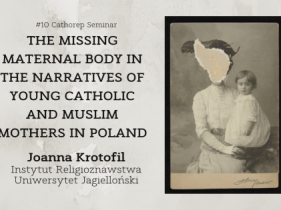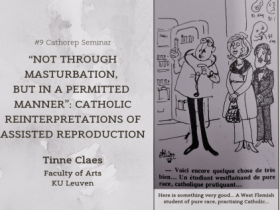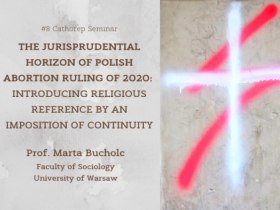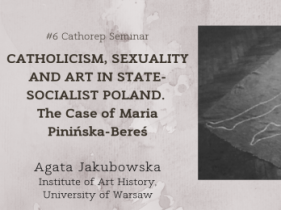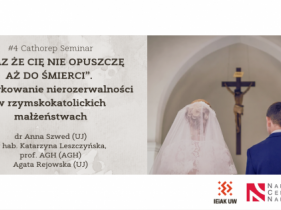Seminaria Katorep

Seminaria projektu "Katolicyzacja reprodukcji, reprodukcja katolicyzmu. Aktywizm i intymność w Polsce od 1930 r. do dziś" (NCN Opus)
08.12.2022, 15:00, Joanna Krotofil, The missing maternal body in the narratives of young Catholic and Muslim mothers in Poland (współautorki: Dagmara Mętel i Dorota Wójciak)
Link do spotkania: https://uw-edu-pl.zoom.us/j/97761973633
Nagranie: https://youtu.be/9P7O_BGIuCs
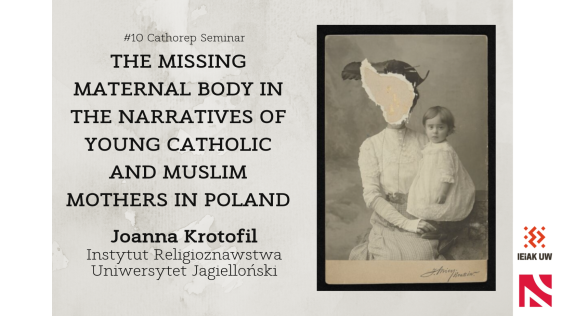
Abstrakt: In the introduction to the edited volume “Philosophical Inquiries into Pregnancy, Childbirth and Mothering”, Lintott and Sander-Staudt note that the “hidden mother” – a widespread practice in 19th-century infant photography – is a fitting metaphor for many contemporary projects on motherhood and mothering, where the maternal subjectivity is downplayed. In this presentation we will argue that in Poland, where Catholicism remains the dominant religion, pregnancy and birth are highly medicalised (Oleś-Bińczyk; Mazurek) and feminists are reluctant to notice and engage with mothers (Graff), the embodied nature of the transition to motherhood is erased from public discourses and from the mother’s own stories. The mother as an embodied subject is missing in public and private space. We will analyse the fragmentarily narrated or entirely missing bodily experiences of pregnancy, birth and postpartum in mothers’ stories revealing the power of religious and medical discourses and practices to produce silence. Looking closely at these silences and omissions, we will also trace the instances when women navigate religious and medical practices in a way that allows them to reclaim their missing maternal embodied subjectivity. We embed our discussion in the context of debates in feminist circles on the importance of a matricentric perspective.
13.04.2022, godz. 16:00 - Tinne Claes, “Not through masturbation, but in a permitted manner”: Catholic reinterpretations of assisted reproduction
Link do spotkania: https://us02web.zoom.us/j/84494231827

About:
This talk shows how Catholic doctors in Belgium, a dominantly Catholic country that was home to the largest Catholic university in Europe, creatively handled church teachings on assisted reproduction from roughly the 1940s until the 1980s. Catholic thought on reproductive medicine is mostly represented as restrictive and conservative, but this is not the full picture. On the contrary, this talk reveals that medical practitioners looked for loopholes within church teachings, creating ‘Catholic’ versions of artificial insemination and in-vitro fertilisation. In so doing, this talk adds a new dimension to recent histories of contraception, which complicate narratives of conflict between religion, science, and sexual liberation.
Bio:
Tinne Claes is a postdoctoral fellow at the University of Leuven. Her research concerns the history of medicine, gender and sexuality in the nineteenth and twentieth centuries. Her current research project elucidates the diverse ways in which infertility was defined and experienced in the postwar period, questioning the privileged position of medical approaches in historical research.
31,03.2022, godz. 16:30 - Marta Bucholc, The jurisprudential horizon of Polish abortion ruling of 2020: introducing religious reference by an imposition of continuity
Link do spotkania: https://us02web.zoom.us/j/86733785293

Opis: On 22 October 2020, the Constitutional Tribunal of Poland ruled abortion due to foetal impairment unconstitutional. I will use the concept of jurisprudential horizon to explain the interplay of religious reference frames with other references framing this ruling, especially international law and human rights, but also contemporary political and social philosophy. Based on a close reading of the Tribunal’s ruling and the dissenting opinions, I will argue that the Tribunal’s decision is yet another symptom of the crisis in which the rule of law in Poland has found itself since 2015. It bears evidence to the closing of the jurisprudential horizon caused by the political change which has been taking place in Poland since 2015, consisting of the reduction of the role of international human rights debates as a reference in Polish constitutional jurisprudence. Retrospectively, the rulings can therefore be seen as a portent of Poland’s compliance issues with its international commitments in human rights matters which came up in 2021 and 2022. At the same time, I will argue that the ruling expands the horizon of constitutional jurisprudence towards religious argumentation by using a rhetorical technique which I will call “the imposition of continuity”.
Bio: Marta Bucholc is professor of sociology at the Faculty of Sociology, University of Warsaw, and associate researcher at the Centre de recherche en science politique, Université Saint-Louis Bruxelles. From 2015 through 2020 she was research professor at Käte Hamburger Centre for Advanced Studies „Law as Culture“, University of Bonn. She was visiting scholar at the universities of Jena, Cambridge, Graz and Saint-Louis Bruxelles, as well as Bronisław Geremek Fellow of the Institute of Human Sciences in Vienna. Her research focus is sociology of law and historical sociology. She is the principal investigator in a research project “National habitus formation and the process of civilization in Poland after 1989: a figurational approach” funded by Polish National Science Centre, and the Polish PI in the Volkswagen Foundation project "Towards Illiberal Constitutionalism in East Central Europe: Historical Analysis in Comparative and Transnational Perspectives”. Her research project “Using Human Rights to Change Abortion Law: Involvement Patterns and Argumentative Architectures in the Global Figuration of Human Rights (Abortion Figurations)” was retained for funding under ERC Consolidator 2021 program.
Recent publications:
Abortion Law and Human Rights in Poland: The Closing of the Jurisprudential Horizon. Hague J Rule Law (2022). https://doi.org/10.1007/s40803-022-00167-9
The Anti-LGBTIQ Campaign in Poland: The Established, the Outsiders, and the Legal Performance of Exclusion. Law & Policy, 44 (1): 4– 22. https://doi.org/10.1111/lapo.12183
Schengen and the Rosary. Catholic religion and the postcolonial syndrome in Polish national habitus, Historische Sozialforschung/Historical Social Research 45 (1) 2020: 153-181.
14.03.2022, godz. 17 - Marta Zimniak-Hałajko, Polskie kultury „pro-life”
Link do spotkania: https://us02web.zoom.us/j/89595020685
Opis: W wystąpieniu zaprezentowane zostaną polskie współczesne ruchy „pro-life” o charakterze pomocowym, udzielające wsparcia kobietom w nieplanowanej ciąży. Przedstawione zostaną typowe aktywności ruchów, wykorzystywane przez nie repertuary gatunków mowy oraz zasoby ikoniczne i symboliczne. Analizie poddane zostaną wzajemne relacje różnorodnych zasobów używanych przez ruchy (sfery synergii oraz konfliktów między zasobami) oraz potencjały ruchów „pro-life” w kształtowaniu polityk i praktyk społecznych – genderowych, opiekuńczych i terapeutycznych.
Bio: Dr hab. Marta Zimniak-Hałajko, antropolożka kultury w Instytucie Kultury Polskiej UW, badaczka ruchów społecznych, w ostatnich latach głównie prawicowych. Autorka między innymi książki Ciało i wspólnota. Wokół prawicowej wyobraźni z 2017 r. (do pobrania z otwartych zasobów). Obecnie zaangażowana w badanie polskich ruchów pro-life.
24.02.2022, godz. 15:30 - Agata Jakubowska, Catholicism, Sexuality and Art in State-Socialist Poland. The Case of Maria Pinińska-Bereś
Link do spotkania: https://us02web.zoom.us/j/88321852378
Opis: Analysis of discourses dealing with female sexuality in state-socialist Poland rarely include visual materials (visual culture and artworks). Analysis of female artists’ representations of female sexuality rarely perceive them as elements of then developing discussions on this theme. I want to propose a reflection on what researchers from such fields as anthropology, history, art history and visual culture studies, can offer each other in studies on their mutual subject of interest: women in state-socialist Poland.
I will present fragments of my research on one female avant-garde artist - Cracow-based sculptor Maria Pinińska-Bereś (1931-1999). Some of her artworks created in the 1960s and 1970s dealt with Catholic attitudes towards female sexuality. Only in the 1990s she admitted that the sources of these pieces laid in her personal history, which in a way turned them into intimate confessions. These artworks by Pinińska-Bereś, their reception and self-commentary that the artists added to them can be considered – I want to argue in my presentation – as enriching the image not only of intimate practices, but also of their articulation in the iconosphere of post/socialist Poland.
Agata Jakubowska - graduated in art history at Adam Mickiewicz University in Poznań, where she worked until 2021. Currently employed at the Institute of Art History at the University of Warsaw. Author and editor of numerous publications on women's art, e.g. Multiple Portrait of Alina Szapocznikow’s Oeuvre (in Polish, 2008); Alina Szapocznikow. Awkward Objects (ed., 2011) and Zofia Kulik: Methodology, My Love (ed. 2019); and the co-editor (with Katy Deepwell) of All-Women Art Spaces in Europe in the Long 1970s (2018).
She has just completed a monograph on Maria Pinińska-Bereś under the title Art and Emancipation of Women in Socialist Poland. The Case of Maria Pinińska-Bereś (in Polish, Warsaw University Press, under review). Currently she is conducting a research on transnational history of all-women exhibitions and runs a research seminar Narrating Art and Feminism: Eastern Europe and Latin America (together with prof. Andrea Giunta, Buenos Aires University, www.cah.wnks.uw.edu.pl)
07.02.2020, Lucia Pozzi, From Onanism to Humanae Vitae: a Catholic Journey into Modern Sexuality

19.01.2022. Anna Szwed, Katarzyna Leszczyńska, Agata Rejowska, „Oraz że cię nie opuszczę aż do śmierci". Praktykowanie nierozerwalności w rzymskokatolickich małżeństwach

13.12.2021. Piotr H. Kosicki, Beyond Neo-Malthusianism: Ludwik Dembiński and the Cold War Biopolitics of Humanae Vitae

6.05.2021. Katarzyna Leszczyńska, Sylwia Urbańska, Katarzyna Zielińska Płeć i polski katolicyzm poza granicami

1.02.2021. Laura Kelly, Contraception, Catholicism and Conscience: family planning practices and anti-contraception activism in the Republic of Ireland, c.1950-1980
Spotkania są organizowane w ramach projektu „Katolicyzacja reprodukcji, reprodukcja katolicyzmu. Aktywizm i intymność w Polsce od 1930 r. do dziś” realizowanego w Instytucie Etnologii i Antropologii Kulturowej Uniwersytetu Warszawskiego, finansowanego w ramach grantu OPUS NCN.
![]()



